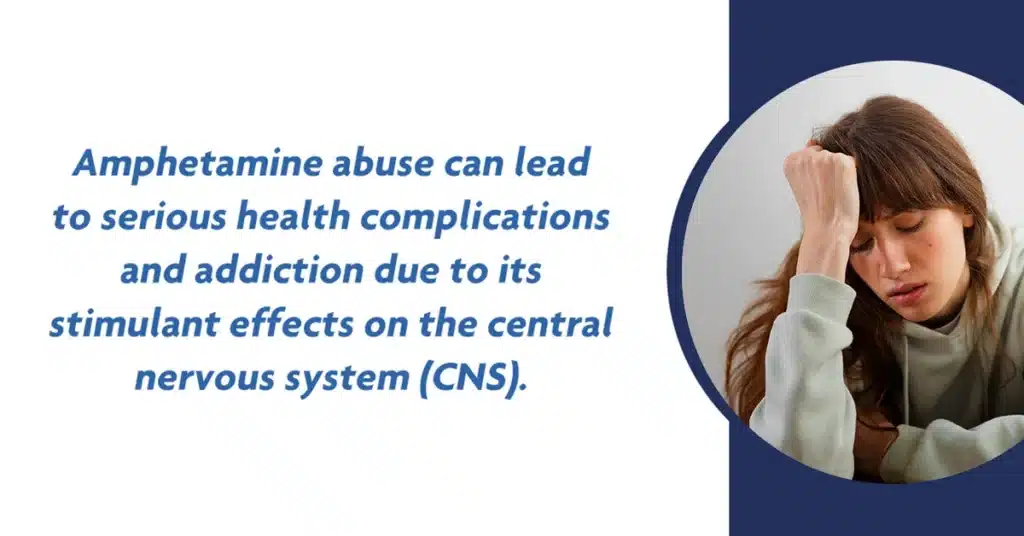Amphetamine Abuse: Exploring the Warning Signs
Amphetamine, a powerful stimulant, is a type of medication that affects the central nervous system (CNS). Doctors commonly prescribe it to treat conditions like attention-deficit hyperactivity disorder (ADHD) and narcolepsy, helping to increase alertness, attention, and energy.
However, when taken improperly, amphetamine comes with a high risk of abuse because of its euphoric effects. This article delves into the issue of amphetamine abuse, shedding light on its signs, adverse effects, and available treatment options.
Key Takeaways
Amphetamines, powerful stimulant drugs, pose risks of misuse and abuse due to their impact on the brain’s reward system. Here is what you need to know:
- Amphetamine abuse can manifest in the form of physical, psychological, and behavioral signs.
- Prolonged amphetamine abuse can lead to severe physical health and mental health problems.
- Sudden stop of amphetamine after regular use can result in severe symptoms of withdrawal.
Reach out to our teen treatment center at (845) 479-6888 today to help your teen recover from substance use disorder (SUD).
What Are Amphetamines
Amphetamines are a class of powerful central nervous system stimulants. They increase neurotransmitters in the brain, such as dopamine and norepinephrine, leading to increased alertness, attention, and energy. They are commonly used to treat conditions like attention deficit hyperactivity disorder (ADHD), narcolepsy, and occasionally obesity.
There are multiple types of amphetamines, including:
- Adderall: A prescription drug that combines amphetamine and dextroamphetamine. It’s often used to treat ADHD and narcolepsy.
- Dexedrine: Contains dextroamphetamine and is used primarily for ADHD and narcolepsy treatment.
- Vyvanse: This is lisdexamfetamine, a prodrug that the body converts into dextroamphetamine. It’s used for ADHD and binge eating disorder treatment.
- Methamphetamine: Meth is a highly potent and addictive amphetamine. It has limited medical use for conditions like ADHD and obesity but is more commonly associated with illegal recreational use due to its strong stimulant effects.
These drugs have medical benefits when used under proper supervision, but they also have a high potential for abuse and addiction. Long-term use or misuse of amphetamines can lead to various health complications. Therefore, using them only as a healthcare professional prescribes is crucial.
Why Are Amphetamines Addictive
Amphetamines are addictive due to their effects on the brain’s neurotransmitter systems, particularly dopamine. Dopamine is a neurotransmitter that is associated with feelings of pleasure, reward, and motivation. When someone uses amphetamines, they increase the levels of dopamine in the brain, leading to feelings of euphoria, increased energy, and alertness.
The brain’s reward system reinforces behaviors that trigger the release of dopamine. With amphetamine use, the brain starts associating taking the drug with a pleasurable reward, leading to a desire to repeat the experience. Over time, this can lead to dependence, where a person feels the need to use the drug to function normally and prevent withdrawal symptoms.
Additionally, prolonged use of amphetamines can lead to tolerance, which means higher doses are needed to achieve the same effects. This cycle of tolerance and dependence contributes to the addictive nature of amphetamines, making it challenging for individuals to stop using them without experiencing withdrawal symptoms and intense cravings.
Amphetamine Abuse Signs: What to Look Out For
Amphetamine abuse is a complex issue that leaves a trail of telltale signs across physical, psychological, and social/behavioral dimensions. Observing physical changes is a key aspect of detecting amphetamine misuse.
Keep a vigilant eye for alterations in appetite, marked by significant weight loss or gain, and be attuned to sleep disturbances such as insomnia or irregular patterns. Physical exhaustion, characterized by frequent fatigue or extreme energy fluctuations, may also be indicative. Dilated pupils, hyperactivity, and potential physical health issues like increased heart rate and blood pressure are further physical manifestations of amphetamine abuse.
Psychological signs provide additional insight into potential amphetamine misuse. Heightened alertness, at times bordering on obsessiveness, may signal an issue. Increased agitation or irritability in situations that wouldn’t normally provoke such reactions, mood swings ranging from euphoria to depression, and the emergence of anxiety and paranoia are psychological red flags. In severe cases, hallucinations and delusions may manifest as a result of amphetamine abuse.
Along with physical and psychological effects, changes in social life and behavior patterns also play a role in identifying amphetamine abuse. Social withdrawal, neglect of work, school, or personal responsibilities, and a tendency towards secrecy and isolation are behavioral indications.
Financial issues stemming from unexplained or frequent problems due to drug spending can also be linked to amphetamine misuse. Additionally, engaging in risk-taking behavior without regard for consequences is a notable social sign of amphetamine abuse.
Recognizing these varied symptoms is important for timely intervention and support. Whether you observe these changes in yourself or someone else, seeking professional help is necessary for addressing amphetamine abuse and facilitating the path toward recovery.
Impact of Long-Term Amphetamine Abuse

Long-term amphetamine abuse can lead to negative consequences, affecting both physical and mental health. Here is the breakdown of these effects:
Physical Health Issues: Long-term amphetamine abuse can severely impact physical health. Prolonged use may lead to cardiovascular problems like high blood pressure, irregular heartbeat, and a higher risk of stroke. These drugs can also suppress appetite and disrupt normal eating patterns, causing malnutrition and unhealthy weight loss.
Regular amphetamine use strains the body, leading to exhaustion, chronic fatigue, and weakened immune system function. Furthermore, excessive intake can result in dental issues like tooth decay and gum disease due to dry mouth and poor oral hygiene habits.
Mental Health Issues: Amphetamine abuse takes a toll on mental health as well. Over time, individuals may develop tolerance, needing larger doses to achieve the desired effects, increasing the risk of addiction. This chronic drug use can induce anxiety, paranoia, and even hallucinations, altering one’s perception of reality.
In addition, long-term amphetamine abuse can trigger mood disorders like depression or worsen pre-existing mental health conditions. The intense highs followed by crashes can lead to emotional instability, impacting relationships and overall well-being.
Withdrawal Symptoms
Amphetamine withdrawal refers to the symptoms that occur when someone who has been using amphetamines regularly suddenly stops or significantly reduces their intake.
Withdrawal symptoms can vary in intensity and duration depending on the dosage, frequency of use, and individual physiology. Some common symptoms of amphetamine withdrawal include:
- Cravings: Intense urges or desires to use amphetamines again.
- Fatigue: A persistent feeling of tiredness and low energy.
- Depression: Feelings of sadness, hopelessness, or loss of interest in activities.
- Increased Appetite: Changes in hunger levels, often resulting in increased food intake.
- Sleep Disturbances: Insomnia or hypersomnia (excessive sleeping) during withdrawal.
- Anxiety: Feelings of nervousness, restlessness, or panic.
- Irritability: Easily becoming frustrated, agitated, or angry.
- Difficulty Concentrating: Problems with focus, attention, and cognitive function.
- Mood Swings: Rapid and intense changes in mood, such as from happiness to sadness.
Depending on the individual, these symptoms can be challenging to manage and may persist for days to weeks. Seeking professional help and support during this period is often recommended to cope with the withdrawal process effectively.
Treatment Options to Overcome Amphetamine Abuse
Treating amphetamine abuse typically involves a combination of approaches that address both the physical and psychological aspects of addiction. Here are some common treatment options.
Detoxification, often a first step in medical treatment, involves gradually reducing amphetamine use under medical supervision or in a specialized detox facility. Medical professionals can assist in managing withdrawal symptoms and provide support to ease the discomfort of withdrawal.
Rehabilitation programs offer structured environments for individuals to focus on recovery. Residential programs provide 24/7 care and support, while outpatient programs offer flexibility and allow individuals to continue their everyday activities while attending therapy sessions.
Various forms of therapy, such as cognitive behavioral therapy (CBT), contingency management (CM), and motivational interviewing (MI), are often used to help individuals understand and change their behaviors related to amphetamine use. Therapy can address triggers, develop coping mechanisms, and teach skills to avoid relapse.
Participation in support groups like Narcotics Anonymous (NA) or other mutual-help groups can provide a supportive community and encouragement during recovery. These groups provide a platform for people to share experiences and strategies for staying sober.
Adopting a healthier lifestyle, including regular physical exercise, a well-balanced diet, and sufficient sleep, is beneficial in recovery. Holistic approaches like mindfulness, yoga, and meditation can also help manage stress and promote overall well-being during recovery.
Remember, treatment plans should be personalized based on individual needs and circumstances. It’s vital to consult with healthcare professionals or addiction specialists to determine the most suitable approach.
Frequently Asked Questions (FAQ)
What are the common side effects of amphetamine use?
Common side effects of amphetamine use include increased heart rate, elevated blood pressure, decreased appetite, insomnia, anxiety, agitation, and, in high doses, the potential for hallucinations or paranoia.
Can changes in a person’s behavior indicate amphetamine abuse?
Yes, changes in behavior can be indicative of amphetamine abuse. Look for signs like increased agitation, impulsivity, social withdrawal, and erratic mood swings. Additionally, neglect of responsibilities and engagement in risky behaviors may signal potential amphetamine misuse.
What are the early signs of a drug addiction?
Early symptoms of drug addiction may include increased tolerance, withdrawal symptoms, neglect of responsibilities, changes in social activities, and unsuccessful attempts to quit. A person may also exhibit secretive behavior and experience a decline in overall health and hygiene.
Guiding Teens Toward Hope and Healing
If your teen is struggling with amphetamine addiction, waiting isn’t the answer. It’s time to take action and get them the professional support they need. With our specialized teen treatment center, we aim to support you every step of the way.
Our team of experts is committed to guiding your teen toward a healthier future through our residential treatment program. Not only this, but our range of comprehensive services is a perfect blend of individual counseling, group therapy, family sessions, and engaging activities like art and music therapy in a supportive and fostering environment.
Act now and contact us at (845) 479-6888. Let us support your teen in reclaiming their life from addiction. Together, we can pave the way for a hopeful tomorrow.


